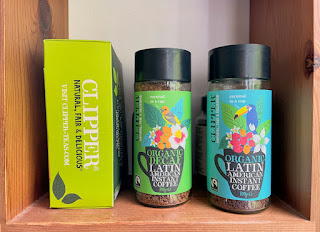I have always enjoyed being "abroad", but these days I have come to hate the business of actually getting there (or getting back home, come to that). How do I loathe thee? Let me count the ways... Quite apart from the wilful absurdity of flying anywhere today on a burning planet, modern-day travel seems to consist of little more than various types of inconvenience, expense, and boredom glued end to end, broken only by episodes of mutual incomprehension and flashes of impotent rage. Travel may broaden the mind (I have always doubted this, myself) but tourism can certainly shorten your life. Grrr... But I've gone on about all this before (see The Trials of Travel) so won't unlock that overstuffed suitcase again.
I mention this because we were away for a week in August, staying in a pleasant hotel in a quiet part of Barcelona. Yes, such a facility in such a place at such a time does exist; it's not all young folk puttin' on the style (though there is quite a lot of that). And, yes, we did fly, with the admittedly feeble excuse that it has been four years since we last fought for luggage-space in the overhead lockers of a cut-price pressurised travel-tube. But I don't propose to bore you with my rather unexciting traveller's tourist's tales and holiday snaps.
But what's that you say? Well, OK then, since you ask, maybe just these few. I'll warm up the magic lantern. Can we dim the lights, please?
Slide 1:
Barcelona in August is by reputation always hot and humid, but was not as badly affected by the latest record-breaking heat-wave as parts further south, and thankfully not immediately under threat from wildfires. Something we hadn't anticipated, however, was that the city goes in for a Paris-style mass vacation during August, leading to streets lined with shuttered establishments of every kind, at least in the less touristy parts of town. It seemed that no sooner had we found an open restaurant that it would shut down the very next day for the rest of the month. No wonder the staff all seemed so cheerfully demob happy. Catalans are not French, of course, so service with a scowl is not de rigueur, but many waiters and bar staff seemed positively skittish, practically high; perhaps they were. That would certainly account for a couple of menu mix-ups, but my shaky Spanish was more likely to blame. At one meal, for example, I got manzana and manzanilla muddled up, receiving a cup of camomile tea instead of the apple tart I thought I had ordered. Being British, of course, I drank the tea uncomplainingly, and as a reward for my stoic / wimpish forbearance slept miraculously well that night. Camomile, eh? Noted. (I know, but I did warn you these adventures were rather unexciting).
Slide 2:
Talking of food, I happen to like nuts very much. I eat a lot of them under normal circumstances, but when travelling and the prospect of delays is inevitable, I usually put a large bag of mixed nuts and raisins in my bag, together with maybe an apple, which make a perfectly satisfactory substitute for a meal. In fact, I like nuts so much I quite look forward to that eventuality. So you can imagine my reaction when a steward announced on our outward flight that "today we have on board someone with a severe nut allergy, and so no food items containing nuts will be sold or should be consumed for the duration of the flight". Noooo!
It reminded me of how, when he was at day nursery, my son's lunchtime sandwich of choice was invariably peanut butter. Then a new child arrived with, yes, a nut allergy, and peanut butter was henceforth banned. Noooo! It was a first taste of what seemed like an emerging issue in the 1990s, where people could die – die! – from exposure to something as benign as a peanut. Which isn't even a real nut, dammit. I don't recall that ever being an issue when I was a kid, when we happily pelted each other at breaktime with various allergenic food items. Although perhaps children were regularly vanishing from our classes, unexplained, and we just didn't notice. Of course, after experiencing school dinners a lot of people have claimed to be "allergic" to semolina, say, or – argh – stewed plums and custard, but a lifelong repulsion is not really the same thing, is it? To say you would rather die than eat stewed prunes is rhetoric; actually to die as a result is not.
Slide 3:
Talking of delays (yes we were), our two-hour flight to Barcelona from Bristol was extended into a three-hour-plus journey by the encounter with passport control. We arrived around lunchtime, simultaneously with several other flights, and joined an enormous queue of several hundred non-EU residents snaking around a tape-barrier maze that filled a swelteringly hot hall, shuffling forward painfully slowly to be inspected by just two customs officials, all the other four or so booths being closed. That aforementioned stoic British forbearance was being tested to its limit. I, for one, kept getting the urge to jump up onto something and demand, "So which of you complacent shits voted for Brexit?? Come on, show yourselves! Put up your hands! Show us your precious blue passports now!!"
However, it turned out that this was not spiteful euro-retribution for an ill-judged referendum. Because exactly the same thing happened on the return flight into Bristol airport. Our flight touched down at 23:30, as scheduled. As did several other flights. Because of the competition we had a tedious 20-minute wait on the tarmac for transfer buses to arrive, and then, yes, joined an enormous queue of several hundred UK residents snaking around a tape-barrier maze that filled a swelteringly hot hall, shuffling forward painfully slowly to be inspected this time by a row of automated booths, containing machines that failed to read the passports or biometric data of a fair number of us, me included, which meant I was directed to yet another queue which led, again, to the only two booths operated by human officials. We eventually arrived home at our Bristol flat at 1:30 in the morning. What was I saying about modern-day travel consisting of nothing more than various types of inconvenience, expense, and boredom glued end to end, broken only by episodes of mutual incomprehension and flashes of impotent rage?
Slide 4:
But enough of this moaning about "First World problems". Such mild inconveniences are nowhere near a fair price or adequate karmic offset for adding to the unwanted tourist burden of faraway places that were perfectly happy as they were before they became playgrounds for people who want to behave like entitled celebs for a couple of weeks, or experiment with their capacity for drink, drugs, and bad behaviour on someone else's doorstep. Not to mention raising property prices, destroying local communities, and accelerating climate catastrophe. We should all stay at home. Although we won't, will we?
Here's a fun thing, though. Like many well-meaning professional-class Brits, at home we favour brands whose green credentials are at least plausible. One of these is Clipper Teas, whose attractive packaging is very distinctive, and clearly designed to appeal to well-meaning professional-class types like us. Now, one of the fundamental problems of being a Brit abroad has always been getting hold of a decent cup of tea, instead of the anaemic infusions that are passed off as "tea" beyond our borders. So you can imagine the delight with which I fell upon an unmistakable box of Clipper "Organic English Breakfast Tea" teabags in a Barcelona store. It was only when looking closer that I noticed something odd.
WTF? It seemed like the most blatant case of copycat brand-theft I'd ever seen, until I discovered that Clipper is marketed as "Cupper" in Europe, because another tea company had already registered the name "Clipper" in Germany (surely "Klipper" in German, though? And no doubt they peddle that instant-piss-in-a-bag stuff, not proper tea). You have to admit that "Cupper Tea" (geddit?) is a smart, economical, and creative typographical move, though, and a classic example of that eternal cliché, turning a problem into an opportunity.
Slide 5:
A final observation, and then I'll shut up. This magic lantern is starting to get a bit too hot, anyway.
I've often remarked that parachuting into an unfamiliar location for a week or two is not a good way to get good photographs. It can work for an experienced photo-journalist, but for most of us it's a waste of time. Your eye is caught by trivialities and novelties, not to mention the touristic eye-candy that everyone wants to photograph (or, these days, photograph themselves standing in front of). So for this trip I decided to take my own advice for once, and restrict myself to the use of my phone, so as merely to document a holiday and nothing more ambitious.
I did in the end pack a small camera as well (Fuji X20) but barely used it: 14 exposures, versus 234 on the phone. I am never the most prolific picture-taker anyway – it's usually a case of one or two shots and I'm done – and most of those 234 phone shots were actually of objects inside various museums that I thought might come in handy for collage purposes. I did have a few regrets (I really wished I'd had a "proper" camera for the dry fountain shot below, for example) but in the main it made for a more relaxing time, just to be able to wander about, behaving and looking just like everybody else, and without the (self-imposed) pressure to find great photographs. Although that fountain is still pretty good, I think: a decent phone camera is a camera, after all. You just have to accept and work within its limitations.















